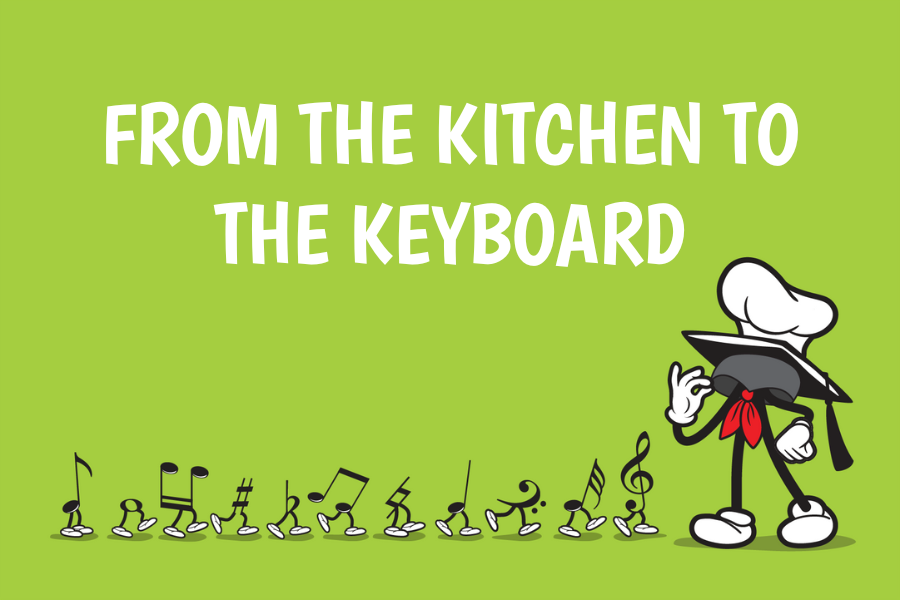From the Kitchen to the Keyboard

One of the best blog posts I ever read was by the highly-acclaimed teacher, composer and pianist Diane Hidy. She laid out a scenario in which someone named James hires themselves a private chef so that he can learn how to cook his very favourite dish in the world, jambalaya. He is excited by the thought of being able to cook it and eat it. But in the first lesson, the chef insists that they cannot possibly cook jambalaya, first he must master a soufflé. James says he doesn’t like soufflé, but the chef insists this is important. So the cooking lessons proceed, and although skills are being acquired, James’ heart is just not in it.
Diane goes on to point out the similarities between this scenario and teaching piano to adults. Very often, they come to their lesson with a desire to learn a particular piece, but the teacher gets completely caught up assigning all the essential exercises and repertoire that must be mastered first… which the adult student finds unrelatable and unenjoyable.
That blog was posted more than 10 years ago, and not only is it still true, but it now applies to our whole studios, not just the adults! In this age of easily accessible sheet music, our students very often come to us not only with the name of the piece they want to learn, but already partially attempted with a poorly-edited version of the score.
So I thought I’d expand a little on Diane’s thoughts. Imagine you love omelettes, and you want to learn how to cook one to perfection. Now imagine that your teacher-chef, in the first lesson, doesn’t let you so much as crack an egg. They insist on lecturing about the history of omelettes, how to source organic eggs from a mountain farm, and they make you do wrist-loosening exercises to work towards the perfect whisking technique. You were looking forward to learning how to make breakfast, but all of a sudden making an omelette feels more like passing a culinary masterclass, and you’re not enjoying the lesson at all.
Now picture the same scenario in a piano lesson. You are an intermediate student who is desperate to learn the Moonlight Sonata. It’s certainly possible, albeit with a simplified arrangement and a little rote teaching. But what if your teacher insists you may not begin to learn it until you’ve done a deep-dive into Beethoven’s biography, studied sonata form, and understood the harmonic structure of C# minor? You may feel mired in tasks which you feel are irrelevant. All you want to do is make beautiful music… and the passion is quickly fading.
The issue with overcomplication is that it focuses more on the teacher’s agenda than the student’s goals. Whether it’s a chef insisting on a certain recipe with no tweaks to suit your taste, or a piano teacher who won’t explore student arrangements or creative interpretations, both approaches risk missing the point of teaching: fostering creativity, enjoyment, and personal growth.
Added to all of this is that we are currently teaching in an age of over-stimulation, shrinking attention spans and overscheduled lives. If our students show a desire to do something, we need to jump straight on it and figure out the best way to get them doing it. Chefs could spend an eternity explaining egg temperatures and the chemical reactions with certain cookware. A piano teacher might get carried away assigning technical work and theory homework. But if all you wanted was to make an omelette, or play a beautiful piece, you’ll quickly lose passion and focus if you feel like you’re wading through a sea of information that doesn’t resonate.
Now obviously, as a piano teacher myself I know that technique, history, and theory are valuable tools, but they should enhance the learning experience—not overshadow the joy of it. A great teacher adapts to the learner’s needs, balancing structure with flexibility. Whether it’s in the kitchen or at the keyboard, it is so important for us as teachers to try to identify what really matters to our students, and to then curate for them an educational path that feels satisfying.

Yes absolutely 100% yes! Love it – thank you 😀 I try to do this…have done some really weird deep dives to the bottom of the internet along the way, but have made some awesome connections with students who feel heard and understood 😀
Amen, sistah!
🙂